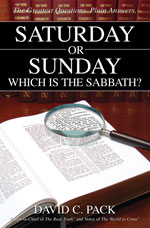Historical records do indicate that the ancient Egyptians had, among their many gods, a god called Amen (the presumed personification of air or breath, represented by a ram or goose). However, no evidence can be found, linking the word amen (Hebrew: “truth”, “so be it”) to this, or any other, pagan god.
The fact that the Bible’s writers were inspired to use the Hebrew word often certainly validates its correctness. What is the Bible’s definition of this word? Read Revelation 3:14. Here, Christ is referred to as “the Amen, the faithful and true witness.” It is used here in direct relation to the terms true and faithful, and emphasizes Christ and His message, the embodiment of TRUTH (John 14:6; 17:17). These verses conclusively show the word’s scriptural meaning.
If we base our use of the word on the Hebrew meaning, then it is not a sin to use it. However, if we attribute life and power to some pagan god as we use it, then we are using it improperly and not in the same manner as did the writers of the Bible. As the Apostle Paul stated, in Romans 14:23, “…whatsoever is not of faith is sin.”
In Matthew 6:13, Christ closed His prayer (the model prayer for all Christians) with “Amen.”
While newspapers, magazines and other news media report what happened, The Real Truth analyzes and explains the root cause of why events happen—why humanity is at a loss to solve today’s problems.
Most professing Christians observe Sunday. Yet, the Jewish people (and a few others) keep the seventh-day Sabbath. Was this day only for the Jews, or only for ancient Israel?
Does the New…


















